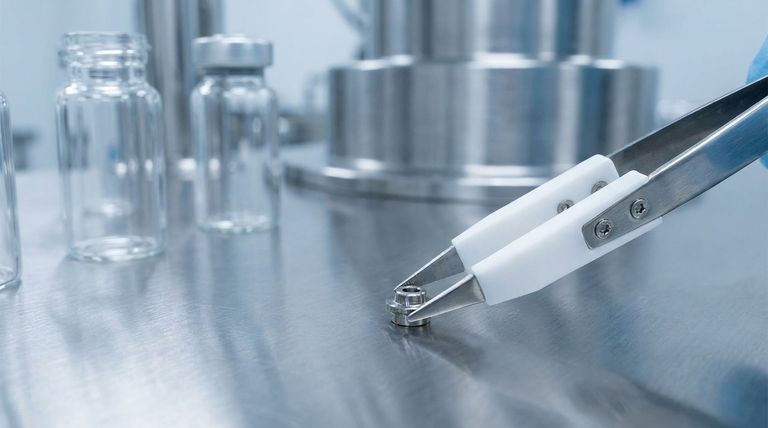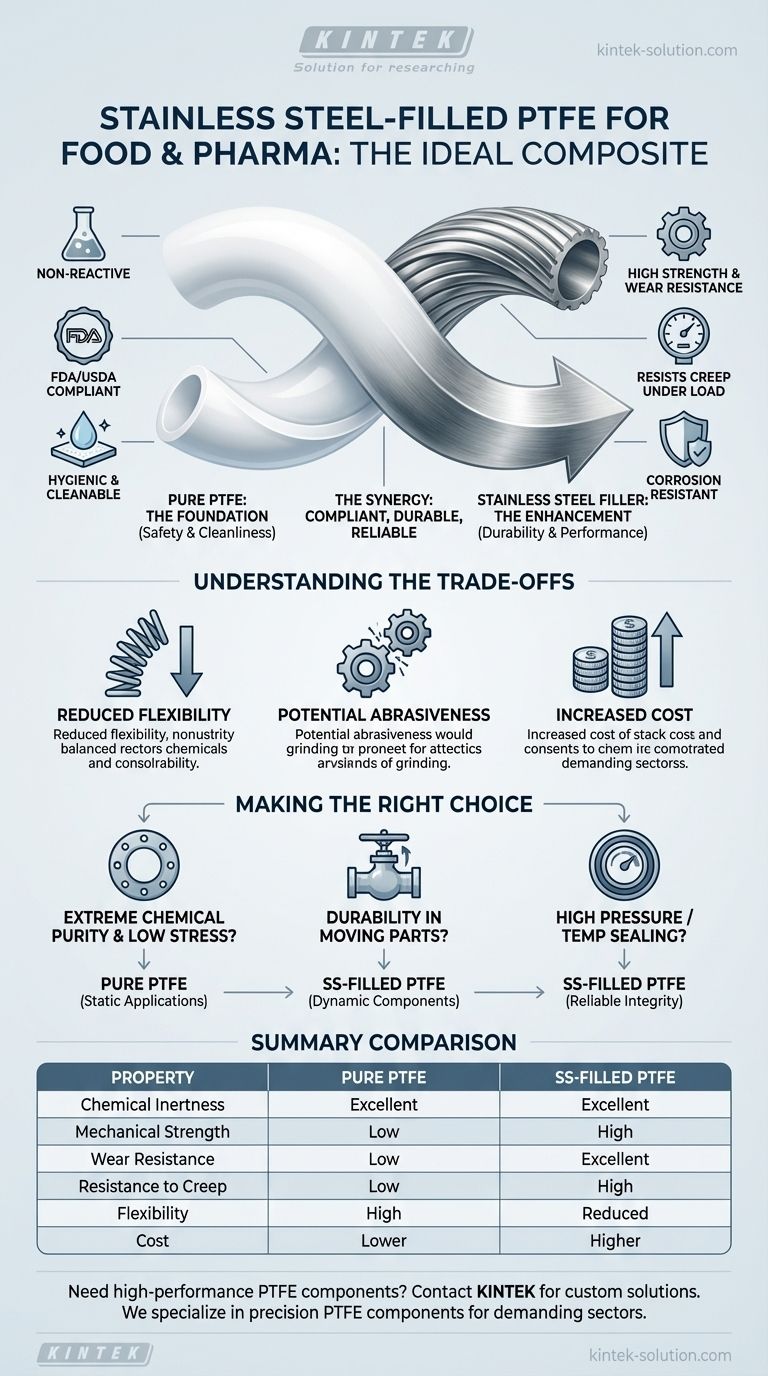In the highly regulated food and pharmaceutical sectors, stainless steel-filled PTFE is the ideal material choice because it marries the inherent safety of PTFE with the physical robustness of stainless steel. This combination creates a composite that is not only compliant and non-contaminating but also durable enough to withstand the demanding mechanical and thermal stresses of industrial processing equipment.
The core advantage is synergy: PTFE provides the chemical inertness and cleanability required for safety, while the stainless steel filler adds the critical mechanical strength and wear resistance that pure PTFE lacks for many dynamic applications.

The Foundation: Why Pure PTFE is the Standard
Before understanding the role of the filler, it's essential to recognize the properties of the base polymer, Polytetrafluoroethylene (PTFE), that make it a cornerstone material in sensitive industries.
Unmatched Chemical Inertness
PTFE is virtually non-reactive. It will not react with or contaminate food products, active pharmaceutical ingredients (APIs), or the aggressive cleaning and sterilization agents used in these environments.
This inertness ensures that the material itself does not compromise product purity or safety at any stage of processing.
Compliance and Safety by Design
Materials used in these industries must meet strict regulatory standards. PTFE is widely FDA-approved and complies with USDA standards for direct contact with food and drugs.
Its non-toxic, non-allergenic, and non-carcinogenic nature makes it a fundamentally safe choice for gaskets, seals, linings, and bellows.
Superior Cleanability and Hygiene
The surface of PTFE is extremely low-friction and non-stick, which prevents materials from adhering to it. This property is critical for hygiene.
This non-stick nature, combined with its resistance to moisture and bacterial growth, makes equipment easier to clean and maintain, upholding the stringent sanitation protocols required in food and pharmaceutical plants.
The Enhancement: The Role of Stainless Steel Filler
While pure PTFE offers exceptional safety and chemical properties, it has mechanical limitations. The addition of a stainless steel filler directly addresses these weaknesses.
Boosting Mechanical Strength and Durability
The primary reason for adding a stainless steel filler is to significantly increase the material's strength, hardness, and resistance to wear and abrasion.
This makes the material suitable for dynamic components like seals, bearings, or valve seats that endure constant movement and high loads, extending the service life of the equipment.
Improving Performance Under Load
Pure PTFE can deform or "creep" under sustained pressure, especially at elevated temperatures. The stainless steel particles create a more rigid structure.
This reinforcement helps the material maintain its dimensional integrity under mechanical stress and high temperatures, ensuring a more reliable and consistent seal or bearing surface over time.
Maintaining Corrosion Resistance
Stainless steel is itself known for its corrosion resistance. When encapsulated within the PTFE matrix, it adds strength without creating a weak point for chemical attack.
This ensures the entire composite material upholds the high standards of corrosion resistance expected in environments with harsh chemicals and frequent washdowns.
Understanding the Trade-offs
No material choice is without its compromises. Acknowledging the trade-offs of stainless steel-filled PTFE is critical for proper application.
Impact on Flexibility
Adding a rigid metallic filler inherently reduces the flexibility and elasticity of the base PTFE. This can be a limitation in applications requiring high levels of conformity or flexibility in a seal.
Potential for Abrasiveness
While durable, stainless steel-filled PTFE can be more abrasive than unfilled PTFE. It may cause wear on softer mating surfaces, such as shafts or housings, over time. This must be considered in the overall system design.
Increased Cost
Specialized filled materials are typically more expensive than their virgin polymer counterparts due to more complex manufacturing processes and the cost of the filler itself.
Making the Right Choice for Your Application
Selecting the correct material requires matching its properties to the specific demands of the environment and the mechanical function of the part.
- If your primary focus is extreme chemical purity with low mechanical stress: Pure, virgin PTFE is often the most suitable and cost-effective choice for static applications like gaskets or linings.
- If your primary focus is durability in moving parts: Stainless steel-filled PTFE provides the necessary wear resistance and strength for components like valve seats, bearings, and dynamic seals.
- If your primary focus is sealing in high-pressure or high-temperature environments: The enhanced strength and resistance to creep make stainless steel-filled PTFE the more reliable option for maintaining seal integrity under load.
By understanding this synergy between polymer and filler, you can confidently specify a material that delivers both regulatory compliance and long-term operational reliability.
Summary Table:
| Property | Pure PTFE | Stainless Steel-Filled PTFE |
|---|---|---|
| Chemical Inertness | Excellent | Excellent |
| Mechanical Strength | Low | High |
| Wear Resistance | Low | Excellent |
| Resistance to Creep | Low | High |
| Flexibility | High | Reduced |
| Cost | Lower | Higher |
| Ideal For | Static gaskets, linings | Dynamic seals, bearings, valve seats |
Need high-performance PTFE components for your demanding applications?
At KINTEK, we specialize in manufacturing precision PTFE components, including custom stainless steel-filled formulations, for the semiconductor, medical, laboratory, and industrial sectors. Our expertise ensures your parts meet stringent regulatory standards while delivering the durability and reliability your equipment demands.
Let us help you enhance your operational reliability and compliance. Contact us today to discuss your custom fabrication needs, from prototypes to high-volume orders.
Visual Guide

Related Products
- Custom PTFE Parts Manufacturer for Teflon Parts and PTFE Tweezers
- Custom PTFE Parts Manufacturer for Teflon Containers and Components
- Custom PTFE Square Trays for Industrial and Laboratory Use
- Customizable PTFE Rods for Advanced Industrial Applications
- Custom PTFE Volumetric Flasks for Advanced Scientific and Industrial Use
People Also Ask
- What are the unique properties of PTFE? Unlock Unmatched Performance in Demanding Applications
- What chemical processing applications involve PTFE-machined parts? Essential Components for Corrosive & High-Purity Systems
- What design considerations are important for custom PTFE parts? Design for Performance & Reliability
- What industrial benefits do PTFE-machined parts offer? Achieve Peak Performance in Demanding Applications
- What factors should be considered when choosing between Nylon and PTFE? Select the Right Material for Your Application



















